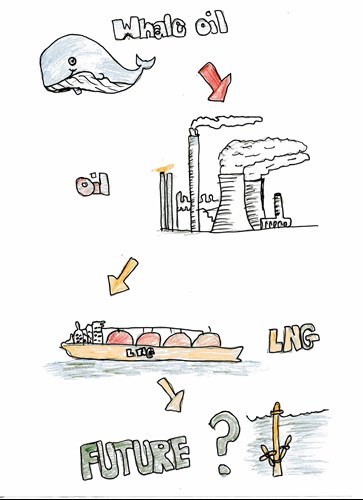Tŷ Hotel Milford Waterfront
Part of The Celtic Collection, the 100 bed hotel opened in 2022 & also boasts a restaurant, bar, private dining area and activity suite.
Find out moreFounded in 1793, the Waterway had always adapted to the need of the world, take a look back at the ups and down of the Waterway and how its future is deemed for great things.
Since Milford Haven was founded in 1793 by Sir William Hamilton, the port of Milford Haven has been known for its connections to the energy industry. Even as far back as 1793, the have was used for the first oil industry, whale oil that is. When the Starbuck Family, a Quaker family from Nantucket boarded the whaler ship Aurora in 1793 and set sail for Milford Haven, they were going to bring a new method of lighting. Whale oil was known for its lighting properties as it burned brighter than other oils like tallow and without the foul smell. Hence in the Port of Milford Haven the oil industry was born.
Fast forward over 150 years and a new oil industry made its home in the Port. In the 1950s oil refineries became a fixture on the Pembrokeshire coast line. Due to the port of Milford Haven being able to boast as being the second deepest natural harbour in the world (Sydney, Australia being the deepest), it became a useful channel to allow large oil tankers the ability to transport in thousands of tonnes of crude oil for the refineries to make different levels of petroleum products. This investment brought with it a number of jobs for local workers and improved the local economy. Unfortunately, with this new industry came new risks and sadly on February 15th 1996 the Sea Empress Oil tanker, which was destined for the Texaco Refinery, ran aground on rocks off St Anne’s head just outside Milford Haven, spilling its contents into the sea and devastating the beaches and wildlife around. A massive clean-up operation began and thankfully was successful. There have also been many dangerous incidents like the tanker explosion at Amoco in August 1983, the explosion at Texaco in July 1994 and most recently the explosion at the Chevron refinery in 2011 which unfortunately killed four people. The switch to alternative fuels and the search for more sustainable fuel supplies has seen the decline in the oil industry on the waterway, with Valero Pembroke Refinery being the last operational refinery.
In 2002, Liquified Natural Gas (LNG) became an industry that wanted to utilise the port of Milford Haven for its transportation. Two LNG terminals now operate from the Port, Dragon LNG and South Hook LNG. The gas is transported on colossal ships that make use of the waterway to transport its products. With the growing pressure for companies to be more environmentally friendly, it is not known how long the oil and gas industry will continue to operate from the port. New methods such as wind and solar power are increasingly being approved. However, the Port can still use its greatest natural asset to look at ways of generating clean energy and who knows in generations to come, we may see tidal energy and wind energy of which there is an abundance of on the coast of Milford Haven help forge the way forward for a more carbon neutral energy source.
Download the Heritage Walking Trails leaflet >
Darllenwch straeon y Deyrnas Ynni yn Gymraeg >


These stories have been researched and written by the pupils of Milford Haven School, who have used their creativity to tell the stories of Milford Haven’s history in their own words.
Three unique heritage walking trails which celebrate our town’s stories and sense of place have been created for everyone to enjoy by the young people of Milford Haven.
Part of The Celtic Collection, the 100 bed hotel opened in 2022 & also boasts a restaurant, bar, private dining area and activity suite.
Find out more